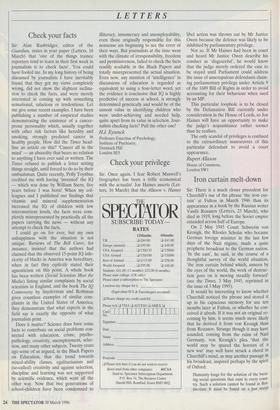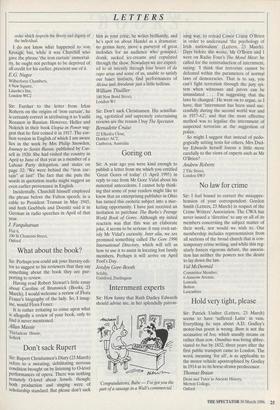Iron curtain melt-down
Sir: There is a much closer precedent for Churchill's use of the phrase 'the iron cur- tain' at Fulton in March 1946 than its appearance in a book by the Russian writer Vasilii Rozanov (Letters, 23 March), who died in 1919, long before the Soviet empire extended across half of Europe.
On 2 May 1945 Count Schwerin von Krosigk, the Rhodes Scholar who became German foreign minister in the last few days of the Nazi regime, made a quite prophetic broadcast to the German nation. 'In the east', he said, in the course of a thoughtful survey of the world situation, 'the iron curtain behind which, unseen by the eyes of the world, the work of destruc- tion goes on is moving steadily forward' (see the Times, 3 May 1945, reprinted in the issue of 3 May 1995).
It would be interesting to know whether Churchill noticed the phrase and stored it up in his capacious memory for use ten months later at Fulton, or whether he con- ceived it afresh. If it was not an original re- coining by him, it seems much more likely that he derived it from von ICrosigk than from Rozanov. Strange though it may have sounded, coming from the ruins of Nazi Germany, von Krosigk's plea 'that the world may be spared the horrors of a new war' may well have struck a chord in Churchill's mind, as may another passage in his broadcast, inspired perhaps by the spirit of Oxford:
Humanity longs for the solution of the burn- ing social questions that exist in every coun- try. Such a solution cannot be found in Bol- shevism. It must be based on a just social order which respects the liberty and dignity of the individual.
I do not know what happened to von Krosigk; but, while it was Churchill who gave the phrase 'the iron curtain' immortal- ity, he ought not perhaps to be deprived of all credit for his earlier, prescient use of it.
E.G. Nugee
Wilberforce Chambers, 8 New Square, Lincoln's Inn, London WC2



























































 Previous page
Previous page